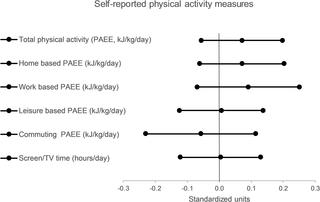PLOS Medicine ( IF 10.5 ) Pub Date : 2020-03-06 , DOI: 10.1371/journal.pmed.1003046 Wendy Hardeman 1 , Joanna Mitchell 2 , Sally Pears 2 , Miranda Van Emmenis 2 , Florence Theil 2 , Vijay S Gc 3, 4 , Joana C Vasconcelos 5 , Kate Westgate 6 , Søren Brage 6 , Marc Suhrcke 4, 7 , Simon J Griffin 6, 8 , Ann Louise Kinmonth 8 , Edward C F Wilson 3, 9 , A Toby Prevost 5 , Stephen Sutton 2 ,

|
Background
The majority of people do not achieve recommended levels of physical activity. There is a need for effective, scalable interventions to promote activity. Self-monitoring by pedometer is a potentially suitable strategy. We assessed the effectiveness and cost-effectiveness of a very brief (5-minute) pedometer-based intervention (‘Step It Up’) delivered as part of National Health Service (NHS) Health Checks in primary care.
Methods and findings
The Very Brief Intervention (VBI) Trial was a two parallel-group, randomised controlled trial (RCT) with 3-month follow-up, conducted in 23 primary care practices in the East of England.
Participants were 1,007 healthy adults aged 40 to 74 years eligible for an NHS Health Check. They were randomly allocated (1:1) using a web-based tool between October 1, 2014, and December 31, 2015, to either intervention (505) or control group (502), stratified by primary care practice. Participants were aware of study group allocation. Control participants received the NHS Health Check only. Intervention participants additionally received Step It Up: a 5-minute face-to-face discussion, written materials, pedometer, and step chart. The primary outcome was accelerometer-based physical activity volume at 3-month follow-up adjusted for sex, 5-year age group, and general practice. Secondary outcomes included time spent in different intensities of physical activity, self-reported physical activity, and economic measures. We conducted an in-depth fidelity assessment on a subsample of Health Check consultations.
Participants’ mean age was 56 years, two-thirds were female, they were predominantly white, and two-thirds were in paid employment. The primary outcome was available in 859 (85.3%) participants. There was no significant between-group difference in activity volume at 3 months (adjusted intervention effect 8.8 counts per minute [cpm]; 95% CI −18.7 to 36.3; p = 0.53). We found no significant between-group differences in the secondary outcomes of step counts per day, time spent in moderate or vigorous activity, time spent in vigorous activity, and time spent in moderate-intensity activity (accelerometer-derived variables); as well as in total physical activity, home-based activity, work-based activity, leisure-based activity, commuting physical activity, and screen or TV time (self-reported physical activity variables). Of the 505 intervention participants, 491 (97%) received the Step it Up intervention. Analysis of 37 intervention consultations showed that 60% of Step it Up components were delivered faithfully. The intervention cost £18.04 per participant. Incremental cost to the NHS per 1,000-step increase per day was £96 and to society was £239. Adverse events were reported by 5 intervention participants (of which 2 were serious) and 5 control participants (of which 2 were serious). The study’s limitations include a participation rate of 16% and low return of audiotapes by practices for fidelity assessment.
Conclusions
In this large well-conducted trial, we found no evidence of effect of a plausible very brief pedometer intervention embedded in NHS Health Checks on objectively measured activity at 3-month follow-up.
Trial registration
Current Controlled Trials (ISRCTN72691150).
中文翻译:

对英国 NHS 健康检查中提供的非常简短的基于计步器的身体活动干预的评估:VBI 随机对照试验。
背景
大多数人没有达到推荐的身体活动水平。需要有效的、可扩展的干预措施来促进活动。通过计步器进行自我监控是一种潜在的合适策略。我们评估了一个非常简短(5 分钟)的基于计步器的干预(“Step It Up”)的有效性和成本效益,该干预是作为国家卫生服务 (NHS) 初级保健健康检查的一部分提供的。
方法和发现
非常简短的干预 (VBI) 试验是一项两个平行组的随机对照试验 (RCT),随访期为 3 个月,在英格兰东部的 23 个初级保健机构中进行。
参与者是 1,007 名年龄在 40 至 74 岁之间、有资格进行 NHS 健康检查的健康成年人。他们在 2014 年 10 月 1 日至 2015 年 12 月 31 日期间使用基于网络的工具随机分配 (1:1) 到干预组 (505) 或对照组 (502),并按初级保健实践分层。参与者了解研究组分配。对照组参与者仅接受 NHS 健康检查。干预参与者还收到了 Step It Up:5 分钟的面对面讨论、书面材料、计步器和步骤图。主要结果是 3 个月随访时基于加速度计的身体活动量,根据性别、5 岁年龄组和一般实践进行调整。次要结果包括在不同强度的身体活动中花费的时间、自我报告的身体活动和经济措施。
参与者的平均年龄为 56 岁,三分之二是女性,主要是白人,三分之二从事有偿工作。主要结果在 859 (85.3%) 名参与者中可用。3 个月时的活动量没有显着组间差异(调整后的干预效果为每分钟 8.8 次计数 [cpm];95% CI -18.7 至 36.3;p= 0.53)。我们发现每天步数、中等或剧烈活动所花费的时间、剧烈活动所花费的时间以及中等强度活动所花费的时间(加速度计衍生变量)的次要结果没有显着的组间差异;以及总身体活动、基于家庭的活动、基于工作的活动、基于休闲的活动、通勤身体活动以及屏幕或电视时间(自我报告的身体活动变量)。在 505 名干预参与者中,491 名 (97%) 接受了 Step it Up 干预。对 37 次干预咨询的分析表明,60% 的 Step it Up 组件得到了如实提供。干预费用为每位参与者 18.04 英镑。每天每增加 1,000 步,NHS 的增量成本为 96 英镑,社会成本为 239 英镑。5 名干预参与者(其中 2 名严重)和 5 名对照参与者(其中 2 名严重)报告了不良事件。该研究的局限性包括 16% 的参与率和保真度评估实践中录音带的低回报。
结论
在这项实施良好的大型试验中,我们没有发现任何证据表明 NHS 健康检查中嵌入的非常简短的计步器干预对 3 个月随访时客观测量的活动有影响。
试用注册
电流控制试验 (ISRCTN72691150)。











































 京公网安备 11010802027423号
京公网安备 11010802027423号